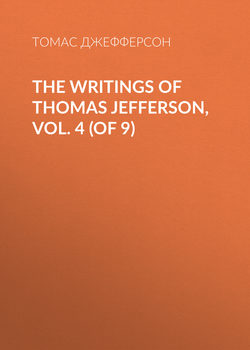Читать книгу The Writings of Thomas Jefferson, Vol. 4 (of 9) - Томас Джефферсон, Thomas Jefferson - Страница 24
TO MR. GENET
ОглавлениеPhiladelphia, September 9, 1793.
Sir,—In my letter of June the 25th, on the subject of the ship William, and generally of vessels suggested to be taken within the limits of the protection of the United States by the armed vessels of your nation, I undertook to assure you it would be more agreeable to the President, that such vessels should be detained under the orders of yourself or the consul of France, than by a military guard, until the government of the United States should be able to inquire into and decide on the fact. In two separate letters of the 29th of the same month, I had the honor to inform you of the claims lodged with the executive for the same ship William and the brig Fanny, to enclose you the evidence on which they were founded, and to desire that if you found it just, you would order the vessels to be delivered to the owners; or, if overweighed in your judgment by any contradictory evidence which you might have or acquire, you would do me the favor to communicate that evidence; and that the consuls of France might retain the vessels in their custody, in the meantime, until the executive of the United States should consider and decide finally on the subject.
When that mode of proceeding was consented to for your satisfaction, it was by no means imagined it would have occasioned such delays of justice to the individuals interested. The President is still without information, either that the vessels are restored, or that you have any evidence to offer as to the place of capture. I am, therefore, Sir, to repeat the request of early information on this subject, in order that if any injury has been done those interested, it may be no longer aggravated by delay.
The intention of the letter of June the 25th having been to permit such vessels to remain in the custody of the consuls, instead of that of a military guard (which, in the case of the ship William, appeared to have been disagreeable to you), the indulgence was of course to be understood as going only to cases which the executive might take, or keep possession of, with a military guard, and not to interfere with the authority of the courts of justice in any case wherein they should undertake to act. My letter of June the 29th, accordingly, in the same case of the ship William, informed you that no power in this country could take a vessel out of the custody of the courts, and that it was only because they decided not to take cognizance of that case, that it resulted to the executive to interfere in it. Consequently, this alone put it in their power to leave the vessel in the hands of the consul. The courts of justice exercise the sovereignty of this country in judiciary matters; are supreme in these, and liable neither to control nor opposition from any other branch of the government. We learn, however, from the enclosed paper, that the consul of New York, in the first instance, and yourself in a subsequent one, forbid an officer of justice to serve the process with which he was charged from his court, on the British brig William Tell, taken by a French armed vessel within a mile of our shores, as has been deposed on oath, and brought into New York, and that you had even given orders to the French squadron there to protect the vessel against any person who should attempt to take her from their custody. If this opposition were founded, as is there suggested, on the indulgence of the letters before cited, it was extending that to a case not within their purview; and even had it been precisely the case to which they were to be applied, is it possible to imagine you might assert it within the body of the country by force of arms?
I forbear to make the observations which such a measure must suggest, and cannot but believe that a moment's reflection will evince to you the depth of the error committed in this opposition to an officer of justice, and in the means proposed to be resorted to in support of it. I am therefore charged to declare to you expressly, that the President expects and requires that the officer of justice be not obstructed in freely and peaceably serving the process of his court, and that in the meantime the vessel and her cargo be not suffered to depart till the judiciary, if it will undertake it, or himself if not, shall decide whether the seizure has been made within the limits of our protection.
I have the honor to be, with great respect, Sir, your most obedient, and most humble servant.
